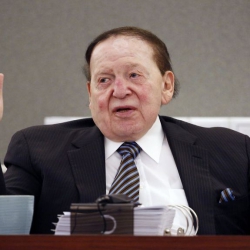The Las Vegas Sands Corp has agreed to pay $9 million in order to end a five-year investigation into allegation the casino company violated the Foreign Corrupt Practices Act. The FCPA is a federal anti-bribery law designed to force companies to assist in combating money laundering.
The investigation involved the Las Vegas Sands’ failure to document over $62 million used by an unidentified consultant from 2006 to 2011, who was doing business in mainland China and its gaming enclave, Macau. To investigators, the $62 million paid to an unidentified person sounded a great deal like a bribe.
SEC Official Makes a Statement
Andrew J. Ceresney, Director of the SEC Enforcement Division, said the gaming company acted inappropriately.
Ceresney said, “Publicly traded companies must have appropriate financial controls in place to ensure that expenses are paid for bona fide services. Las Vegas Sands failed to implement controls to prevent tens of millions of dollars from being paid out without appropriate documentation or authorization.”
The civil settlement in the case allowed Las Vegas Sands to avoid any admission of wrongdoing. The company can rightly say the investigation into 5 years of financial activity could prove no corrupt intent or bribery.
Inaccurate Records of the Payments
Investigators at the Securities and Exchange Commission (SEC) found that Las Vegas Sands Corp kept inaccurate records of the payments. Their files showed the casino company failed to authorize payments to the consultant, known only as “The Beard”, over the course of 5 years.
Basketball Teams and Buildings
The Beard was used by the Las Vegas Sands corporation to hide the fact it was purchasing assets in mainland China. Among the assets purchased was a basketball team in the Chinese Basketball Association. Gambling corporations are barred from owning a CBA basketball team, for many of the same reasons the NFL and NBA keep gaming executives from owning franchises in their leagues. A building associated with the team also was purchased.
Ultimately, the consultant was paid $700,000 gaming company for help in the case by the Las Vegas, which owns the Venetian Macau and Sands Macau casinos in the country. Another $1 million was paid in “property management fees”, though the building was not being managed by a property management company. Also, another $1.4 million was paid for artwork to decorate the building, though no artwork ever was purchased.
Sands China Troubles
Sands China Ltd, a subsidiary of Las Vegas Sands Corp, never accounted for the payments through their casino treasuries, leading to the suspicion the money might have been used to bribe Chinese officials.
Federal and state agencies were involved in the multi-year investigation. The various agencies involved included the Federal Bureau of Investigation, the Fraud Section of the U.S. Department of Justice, the SEC, and the Nevada Gaming Control Board.
Steve Jacobs Lawsuits
The Feds began their investigation after filings in an wrongful termination lawsuit by Steve Jacobs, the former CEO of Sands China Ltd. Jacobs launched a wrongful termination and breach of contract lawsuit against Las Vegas Sands Corp, claiming he was ousted for refusal to become involved in corrupt practices.
After years of legal filings and preliminary testimony, that case — Steven Jacobs v. Las Vegas Sands Corporation — is set to begin on June 27, 2016. The Jacobs trial has been a source of consternation for Las Vegas Sands Corp chairman Sheldon Adelson, who has called for the judge in the case to be replaced.
Sheldon Adelson to Testify
Instead, the judge ordered recently that Sheldon Adelson should be forced to undergo up to 48 hours of testimony in the case. When the trial finally get underway, it is expected to contain a number of revelations about the business practices for the Las Vegas Sands Corporation.
The timing of the civil settlement therefore has to do with limiting potentially damaging testimony in the upcoming case. Currently, bribery and corruption in international business circles is at the top of the news, due to the leakage of the Panama Papers.

